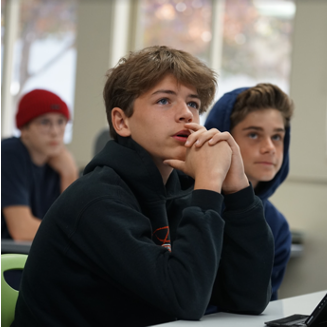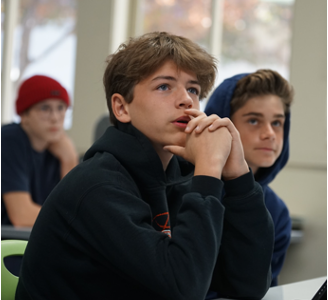Click here to listen to this week’s JAM – Just Right Challenge.
Here’s the problem: There are 41 people in a circle. The first person hits the second person with a pie, which means they are out. Then the third person hits the fourth person with a pie. Out. The fifth hits the sixth, out, and so on until 40 hits 41, out, and it’s back to 1 who hits 3 and so on until there is only one person left. Who is the last person?
I watched the other day as a small group of 6th graders worked through this problem. It was part of a challenge group, an opt-in experience for students who are seeking a chance to push themselves harder and engage in complex mathematical thinking. The group moved through the process initially as individuals – writing out numbers on the whiteboard table and crossing them out until they found the answer. Director of Teaching & Learning Ilsa Dohmen who was facilitating the group named for them that was solving through “brute force,” a reasonable strategy, and then upped the challenge. “How would you learn the answer, regardless of the number of people?” What followed was a process of trial and error, a process that extended beyond the period I was able to watch.
Challenge groups, which are offered currently in grades 3-6 and will be added in 2nd grade this Spring, are just one example of ways in which we are expanding our ability to provide each student a “just right” challenge. Other things we have done this year include “ready for more” sections that are an integrated part of our new math curriculum, Illustrative Math, Lower School “Think Tank” problems and Middle School Challenge Packets that are readily available options for students, Math Club & Kangaroo Competition in 3rd and 4th grade, Math Club and Robotics Club in Middle School.
Ultimately, the just right challenge is not only for math, but math has provided a good focal point for this school year. As we are leaning into this work, we are aware of the importance of grounding it in best practices around the science of learning. Several key concepts from COGx, an organization that is working with us to further our understanding of the science of learning, are especially relevant, including “productive failure,” or the idea that grappling with a problem before getting instruction on exactly how to do it, helps students learn new concepts more fully and retain the knowledge longer, and “desirable difficulties,” or the idea that slowing the apparent rate of learning by creating desirable difficulties for students allows them to process information more fully. In addition, the consistent use of pre-assessments, student surveys and student self-assessments when designing many of these challenge experiences allow teachers to guide students to different challenges when appropriate, while also providing students a healthy level of ownership over their own journey.
It has also allowed us to focus on math process skills – or, as we talk about it with students, “how I learn and think about math.” Skills include problem solving – persevering with difficult and/or novel problems by making sense of the problem and applying appropriate mathematics, making connections – the ability to solve a problem using various methods, and reasoning & proof – justifying whether a solution makes sense in context. At the heart of all of this is an effort to nurture a love of math and develop a community of problem solvers and critical thinkers.
It is yet another way in which we are striving to prepare students for the future, a future that we cannot yet imagine. It is a future in which we expect content will become increasingly less important, while skills, particularly critical thinking, creativity, collaboration, and problem solving, will become vital to ensuring students are able to adapt and thrive. And, while I doubt that any of our students will ever find themselves in a situation where they are surrounded by a large group of people in a circle with pies, I am confident that students who can grapple with that type of problem – and then use it to create generalizable rules – will be well-equipped for anything that might come their way.

